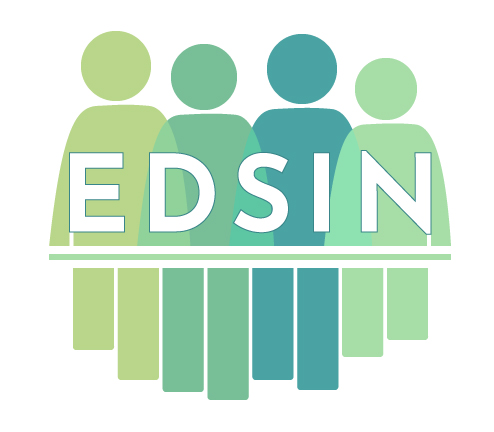EDSIN Code of Conduct
This code of conduct outlines our expectations for participants within the EDSIN community, both online and at in-person events, as well as steps to reporting unacceptable behavior. We are committed to working to provide a welcoming, safe, and inspiring community for all and expect our code of conduct to be honored. Anyone who violates this code of conduct may be removed from the network. If you would like to make edits or suggestions for improving EDSIN's code of conduct, please visit the gDoc here.
Participation Guidelines
In following EDSIN’s code of conduct, you should keep the following expectations about behavior in mind, which are essential for creating a welcoming and safe environment:
- Physical, sexual, and verbal harassment are unacceptable.
- Do not discriminate against people because of their identity (e.g. race, gender, sexuality, age, class background, ability, religion, and more).
- We expect participants to work together to create a welcoming, inclusive, and safe(r) environment for people from diverse backgrounds.
- Ask for consent (i.e. permission) and respect people’s boundaries.
- Be considerate in your interactions with others and careful about the words you use. Is the language that you’re using discriminatory?
- Be mindful of how much time and space you’re taking up. Be aware of the dynamics of power and privilege, and whether you’re taking advantage of it.
Anti-Harassment Policy: At Events & Online
We value your participation. We do not tolerate harassment of EDSIN community members in any form—online or at in-person events. Community members asked to stop any harassing behavior are expected to comply immediately.
Our Code of Conduct and Anti-Harassment Policy extend to all aspects of EDSIN where individuals’ behavior affects the ability of others to participate. This includes online interactions (e.g. conference hashtag, interacting on conference-related platforms such as QUBESHub), as well as “after hours” at the conference, including evening social events. All conference and community participants, including sponsors, are subject to the anti-harassment policy.
If needed, conference and network hosts will provide information for participants to contact local law enforcement. Hosts will also make efforts to provide escorts or otherwise assist those experiencing harassment to feel safe, at the request of a participant. A full list of potential sanctions is provided below.
Harassment Definitions
For purposes of this code of conduct, sexual harassment is defined as unwelcome sexual advances, requests for sexual favors, or other verbal or physical conduct of a sexual nature when such conduct interferes with an individual’s ability to participate in the EDSIN community or creates an intimidating, hostile, or offensive environment.
Other harassment is defined as verbal or physical conduct that denigrates or shows hostility or aversion toward an individual because of their race, color, religion, national origin, sex, age, sexual orientation, gender identity or expression, personal appearance, political affiliation, marital status, family responsibilities, veteran status, matriculation, disability, mental illness, neuro(a)typicality, or any other legally protected status, and that creates an intimidating, hostile, or offensive environment for participation or unreasonably interferes with an individual’s ability to participate in the community.
We will not act on complaints regarding reverse-isms (e.g. reverse racism, reverse sexism), reasonable communication of boundaries (such as “leave me alone”), refusal to explain or debate topics, or criticism of ‘tone’ or oppressive behavior.
Reporting Issues
If you experience or witness behavior that violates the code of conduct at EDSIN’s conference or online, please submit a report directly to EDSIN staff:
Alycia: acrall@battelleecology.org, (970) 227-3310
In your report, please do your best to include:
- Your contact information
- Identifying information of the participant who has violated the code of conduct
- The behavior that was in violation
- The approximate time of the behavior (if different than the time the report was made)
- Where the code of conduct violation happened
- The circumstances surrounding the incident
- Other people involved in or witness to the incident
- If you believe the incident is ongoing, please let us know
- Any additional helpful information
How We Respond to Reports
Actions in response to reports can range from warnings with instructions on how to correct behavior that violated the code of conduct to immediate removal from EDSIN events, online communities (e.g. email lists, community calls), and future engagement.
The following is a list of potential sanctions for anyone who violates the code of conduct, depending on the severity of the violation.
- Warning the accused to cease their behavior and that further reports may result in sanctions
- Ending a talk that violates the policy early
- Not publishing the video, slides of a talk, or poster that violated the policy
- Not allowing a speaker who violated the policy to give (further) talks at the event
- Immediately ending any responsibilities and privileges the accused holds
- Requiring that the accused immediately leave the event and not return
- Banning the accused from future events (either indefinitely or for a certain time period)
- Being banned or blocked on online community platforms, e.g. on our Community Discussion List, reported on Twitter, removed from online community groups (e.g. QUBESHub)
- Being reported to the proper authorities
Acknowledgement: This code was derived from the OpenCon’s Code of Conduct.
